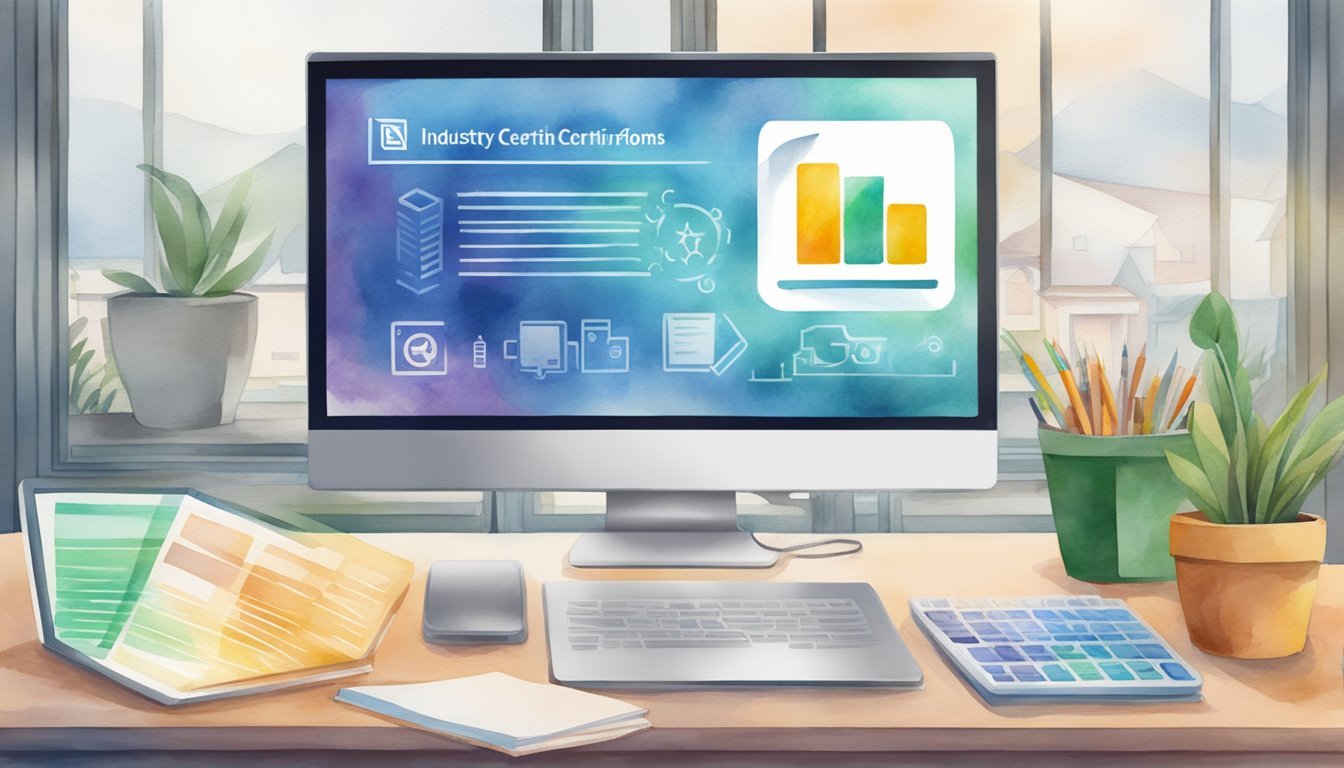7 Industry-Recognized Online IT Certification Programs That Boost Your Career Prospects

Getting an IT certification can boost your career and open up new job opportunities.
Many companies value these credentials when hiring or promoting employees.
Online programs make it easier than ever to earn certifications from home.

This article looks at seven top online IT certification programs. These industry-recognized certifications can help you gain in-demand skills and stand out to employers. You’ll learn about options in different IT areas like cybersecurity, cloud computing, and network administration.
1) Certified Information Systems Security Professional (CISSP)
The CISSP is a top-tier certification for IT and cybersecurity professionals.
It shows you can design, implement, and manage top-notch cybersecurity programs.
To get this cert, you need at least five years of work experience in two or more of the eight CISSP domains.
These cover areas like security and risk management, asset security, and software development security.
CISSP certification proves your deep technical and management skills in information security.
It’s globally recognized and can boost your career prospects.
The exam is tough and covers a wide range of topics.
You’ll need to study hard and may want to take a prep course. Live online training costs about $2,550 without the exam, or $3,337 with it included.
Once you pass, you become an ISC2 member.
This gives you access to lots of resources and tools to help you keep learning and growing in your field.
The CISSP is so well-respected that it’s now seen as equal to a master’s degree in some places.
This shows just how valuable it can be for your career.
2) Cisco Certified Network Associate (CCNA)
The CCNA is a widely recognized IT certification that can jumpstart your networking career.
It covers a broad range of fundamentals for various IT roles.
With CCNA, you’ll gain skills in network technologies, security, and software development.
These are valuable assets that businesses need in today’s competitive market.
To earn your CCNA, you need to pass one exam: 200-301 Cisco Certified Network Associate.
This test evaluates your knowledge of network basics, access, IP connectivity, and services.
The exam also covers security fundamentals, automation, and programmability.
It takes 120 minutes to complete and includes new topics like generative AI.
CCNA certification can prepare you for several IT jobs.
These include network engineer, IT specialist, and systems administrator.
By earning a CCNA, you demonstrate your ability to implement and manage networking and IT infrastructure.
This can open doors to various career paths in the IT field.
The CCNA program offers comprehensive training to help you succeed.
You’ll find study materials, practice exams, and other resources to support your certification journey.
3) Google Associate Cloud Engineer
The Google Associate Cloud Engineer certification proves your skills in working with Google Cloud Platform (GCP).
It’s a great starting point for IT professionals looking to break into cloud computing.
This certification shows you can deploy and secure applications on GCP.
You’ll learn to manage cloud projects and use key GCP services.
The exam tests your knowledge of core GCP services.
These include Compute Engine, App Engine, and Kubernetes Engine.
You’ll also need to understand networking, storage, and database options.
To prepare, you can take online courses or use Google’s official study materials.
Hands-on practice with GCP is crucial for success.
The certification is valid for two years.
After passing, you can showcase your skills to potential employers.
It’s a valuable credential in the growing cloud computing field.
Many companies use GCP for their cloud needs.
This certification can help you stand out when applying for cloud-related jobs.
It shows you have practical skills that businesses value.
Remember, the exam focuses on real-world scenarios.
You’ll need to solve problems like you would in an actual work environment.
This makes the certification highly relevant to employers.
4) CompTIA Security+
CompTIA Security+ is a popular IT certification that focuses on cybersecurity skills.
It’s a great starting point for those interested in working in information security.
The exam covers six main areas.
These include threats and vulnerabilities, technologies and tools, architecture and design, identity and access management, risk management, and cryptography.
You’ll learn how to spot and deal with security risks.
The certification also teaches you about network security and how to protect data.
CompTIA Security+ is vendor-neutral.
This means it’s not tied to any specific company’s products.
It gives you a broad understanding of security concepts that apply across different systems.
Many employers look for this certification when hiring for IT security roles.
It can help you stand out in the job market and potentially earn a higher salary.
The exam takes about 90 minutes to complete.
It includes multiple-choice and performance-based questions.
These test your ability to solve real-world security problems.
To prepare, you can take online courses or use study guides.
CompTIA offers official training materials, but there are also many third-party resources available.
The certification is valid for three years.
After that, you’ll need to renew it to keep your skills up-to-date.
This ensures you stay current with the latest security trends and threats.
5) Certified Ethical Hacker (CEH)
The Certified Ethical Hacker (CEH) is a top certification for IT professionals interested in cybersecurity.
It teaches you how to think like a hacker to better protect systems from attacks.
With CEH, you’ll learn about the five phases of ethical hacking.
This knowledge helps you set up stronger security measures for organizations.
The certification covers over 500 attack techniques.
You’ll gain hands-on experience through labs that simulate real-world scenarios.
CEH is globally recognized.
It can help you work anywhere as a cybersecurity professional.
Many employers value this credential when hiring for security positions.
To get certified, you need to pass an exam.
The test checks your understanding of hacking tools, techniques, and methods.
You have flexible learning options for CEH.
You can choose live, online, or hybrid training to fit your schedule.
After getting your CEH, you can aim for the CEH (Master) credential.
This advanced certification shows even deeper skills in ethical hacking.
The CEH program is run by EC-Council, a respected organization in cybersecurity education.
They keep the course updated with the latest threats and defenses.
6) AWS Certified Solutions Architect
The AWS Certified Solutions Architect certification is a valuable credential for IT professionals.
It focuses on designing cost-effective and high-performance solutions using Amazon Web Services (AWS).
This certification comes in two levels: Associate and Professional.
The Associate level is a good starting point if you’re new to AWS or cloud computing.
To earn the AWS Certified Solutions Architect – Associate certification, you need to pass an exam.
The exam tests your knowledge of key AWS services and best practices for building secure and reliable applications.
The Professional level is for those with more experience.
It requires at least two years of hands-on practice designing and deploying cloud architecture on AWS.
This advanced certification covers complex topics and scenarios.
Both certifications are highly respected in the industry.
They show that you can design and implement distributed systems on the AWS platform.
To prepare for these exams, you can take AWS training courses.
These courses cover essential AWS services and architectural best practices.
After getting certified, you join a group of over 1 million AWS Certified individuals.
This certification can open up new career opportunities and demonstrate your expertise to employers.
7) Microsoft Certified: Azure Fundamentals
The Microsoft Certified: Azure Fundamentals certification is a great starting point if you’re new to cloud computing and Azure.
It covers basic cloud concepts, core Azure services, and Azure management tools.
This certification doesn’t require any prior experience with Azure.
It’s designed for anyone who wants to learn about cloud services and how they work with Microsoft Azure.
The exam tests your knowledge of cloud concepts, Azure services, Azure workloads, security and privacy in Azure, and Azure pricing and support.
You’ll need to understand these topics at a foundational level.
To prepare for the exam, you can use Microsoft’s free online learning resources.
These include self-paced learning paths, hands-on labs, and practice tests.
Once you pass the exam, you’ll earn the Azure Fundamentals certification.
This can help you stand out to employers and show your understanding of cloud basics and Azure.
The certification is a good first step if you’re interested in more advanced Azure roles.
It can lead to other Azure certifications that focus on specific job roles or technologies.
Remember, cloud skills are in high demand.
Getting certified in Azure can open up new career opportunities in IT and cloud computing.
Benefits of IT Certification

IT certifications offer valuable advantages for tech professionals.
They can boost your career, prove your skills, and gain industry recognition.
Career Advancement
IT certifications can open doors to new job opportunities.
They show employers you have up-to-date skills in specific areas.
This can lead to higher paying roles and faster promotions.
Many companies prefer or require certain certifications for tech jobs.
Having these can put you ahead of other job seekers.
It proves you’re committed to your field and keeping your skills current.
Certifications can also help you switch to a new IT specialty.
They give you a way to learn new skills and prove your knowledge in a different area.
Skill Validation
Certifications provide a way to test and prove your IT skills.
They show you can apply your knowledge to real-world problems.
Many certification exams include hands-on tasks.
This tests your practical skills, not just book knowledge.
Passing these exams proves you can handle real IT challenges.
Certifications also keep your skills up-to-date.
Technology changes fast, and certifications often require renewal.
This ensures you stay current with the latest tech trends and best practices.
Industry Recognition
IT certifications are recognized worldwide.
They provide a standard way to measure skills across companies and countries.
Some certifications are highly respected in specific IT fields.
For example, Cisco certifications are valued in networking.
Microsoft certifications are important for those working with Windows systems.
Certifications can boost your professional credibility.
They show clients and coworkers that experts have verified your skills.
This can lead to more trust and respect in your workplace.
How to Choose the Right Certification Program

Picking the best IT certification program takes careful thought.
You’ll need to think about your career goals and the different levels of certifications available.
Assessing Your Career Goals
Start by looking at where you want your IT career to go.
What job do you want in the future? Make a list of the skills you need for that job.
Look for certification programs that match those skills.
This will help you focus on the right areas.
Think about the time you can spend studying.
Some programs take more time than others.
Also, look at the cost.
Pick a program that fits your budget and schedule.
Check job postings for roles you want.
See what certifications they ask for.
This can guide your choice.
Understanding Certification Levels
IT certifications come in different levels.
Each level builds on the one before it.
- Entry-level: For beginners or those new to IT
- Associate: For people with some experience
- Professional: For those with several years in IT
- Expert: For highly skilled IT pros
Start with a level that matches your current skills.
You can always move up later. Look for programs that offer a clear path to higher levels.
Some certifications focus on specific tech areas.
Others cover broader skills.
Pick one that fits your needs.
Remember, you can always add more certifications as you grow in your career.
Preparation Tips for Certification Exams

Studying for IT certification exams can be tough.
But with the right approach, you can boost your chances of success.
Here are some tips to help you prepare:
- Make a study plan
- Use official exam guides
- Take practice tests
- Join study groups
- Get hands-on experience
Creating a study schedule is key.
Set aside time each day to review exam topics.
Break big concepts into smaller, manageable chunks.
Official exam guides are your best friends.
They cover all the topics you need to know.
Make sure to read them thoroughly.
Practice tests help you get used to the exam format.
They also show you where you need more work.
Take them often to track your progress.
Study groups can be really helpful.
You can share ideas and learn from others.
Look for online forums or local meetups in your area.
Don’t forget about hands-on practice.
Many IT certs require practical skills.
Set up a home lab or use virtual environments to gain real-world experience.
Stay focused and believe in yourself.
With hard work and these tips, you’ll be ready to ace your certification exam.
Frequently Asked Questions

IT certifications can boost your career prospects and validate your skills.
Many programs are available online, with varying costs, durations, and difficulty levels.
What are the top online IT certification programs that are widely recognized in the industry?
The Certified Information Systems Security Professional (CISSP) is highly respected in cybersecurity.
Cisco Certified Network Associate (CCNA) is popular for networking roles.
Google Associate Cloud Engineer is great for cloud computing careers.
CompTIA Security+ is an excellent entry-level security certification.
The Certified Ethical Hacker (CEH) credential is valued for those interested in penetration testing.
Which IT certifications are available for free online with a certificate upon completion?
Some platforms offer free IT courses with certificates.
Google Digital Garage provides free digital marketing certifications.
Microsoft Learn has free Azure certification training.
HubSpot Academy offers free inbound marketing certifications.
You can also find free cybersecurity courses on Cybrary.
How long does it take to complete an IT certification program online?
Completion times vary widely.
Some certifications can be earned in a few weeks, while others may take several months.
Most programs require between 9 to 30 credits, which translates to roughly 3-12 months of study.
Your pace and prior experience will affect completion time.
What are the best IT certifications for beginners to pursue?
CompTIA A+ is an excellent starting point for IT careers.
It covers basic hardware and software knowledge.
Google IT Support Professional Certificate is another great option for beginners.
It teaches fundamental IT skills and customer service.
Microsoft Technology Associate (MTA) certifications are also beginner-friendly.
They cover various Microsoft technologies.
Are there any government-sponsored online courses that offer IT certifications?
The U.S. Department of Labor sponsors apprenticeship programs that include IT certifications.
These combine on-the-job training with online learning.
The National Initiative for Cybersecurity Careers and Studies (NICCS) offers free cybersecurity courses.
Some may lead to certifications.
Which IT certifications can be obtained online in the shortest amount of time?
CompTIA IT Fundamentals can often be completed in a few weeks.
It’s a basic certification that introduces key IT concepts.
Puppet certification for IT infrastructure automation can be obtained relatively quickly.
The exam prep course is short and focused.
Some cloud certifications, like AWS Certified Cloud Practitioner, can be earned in a month with focused study.






